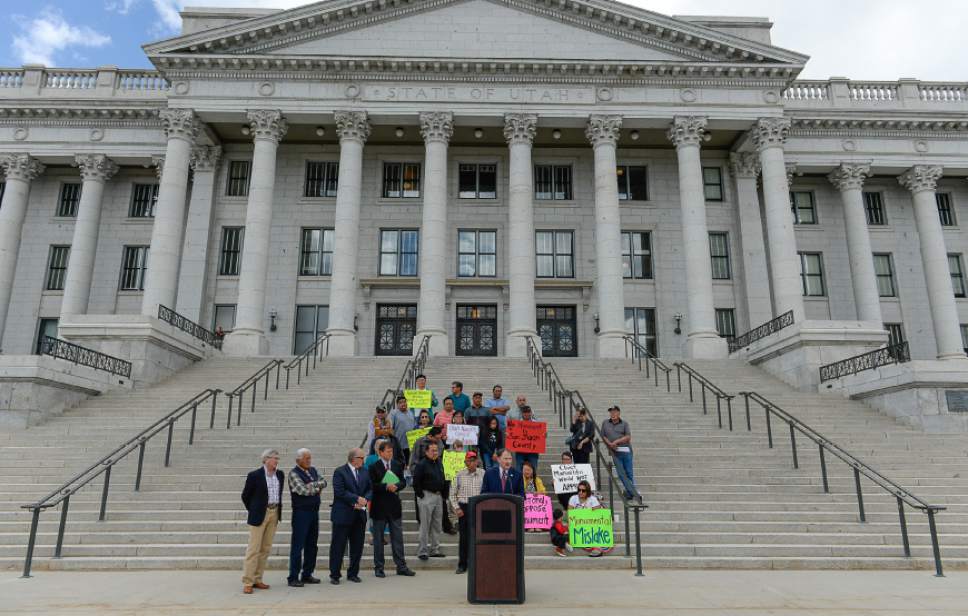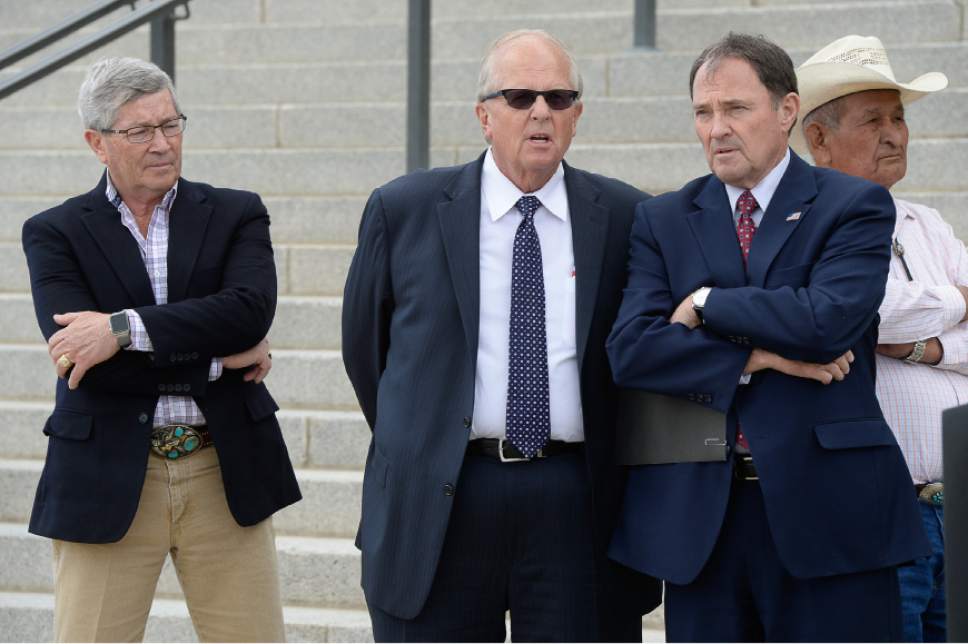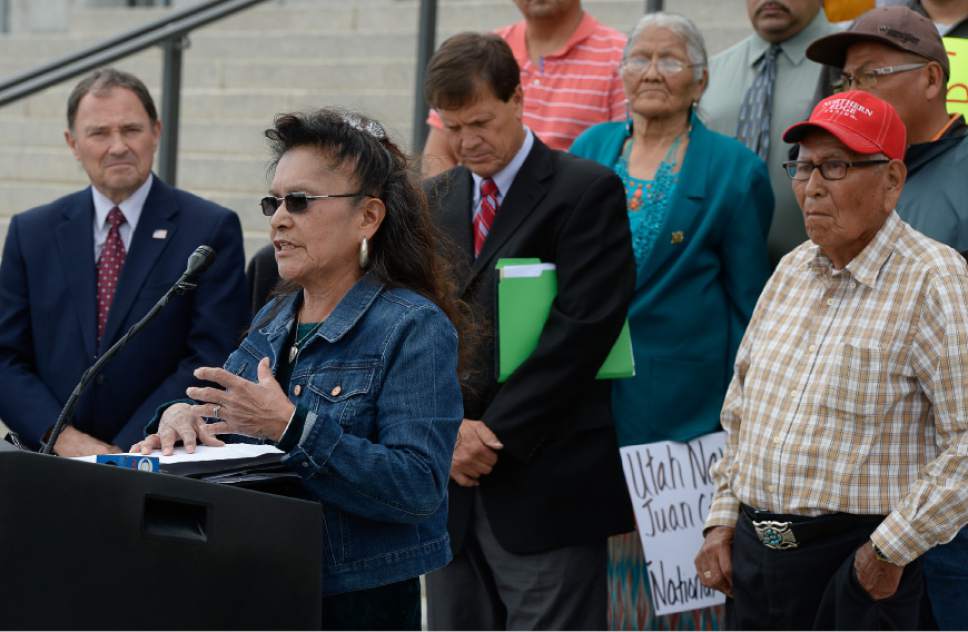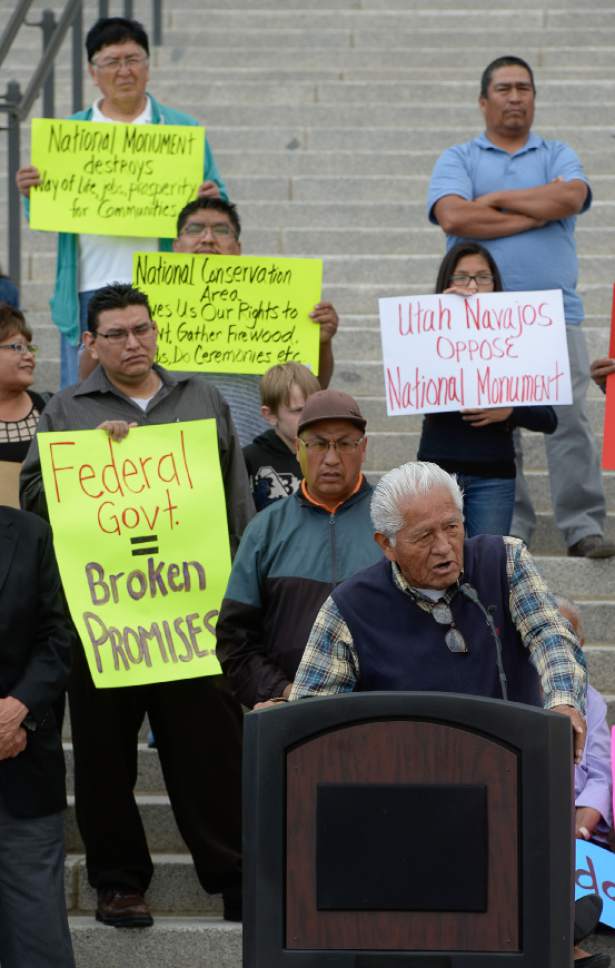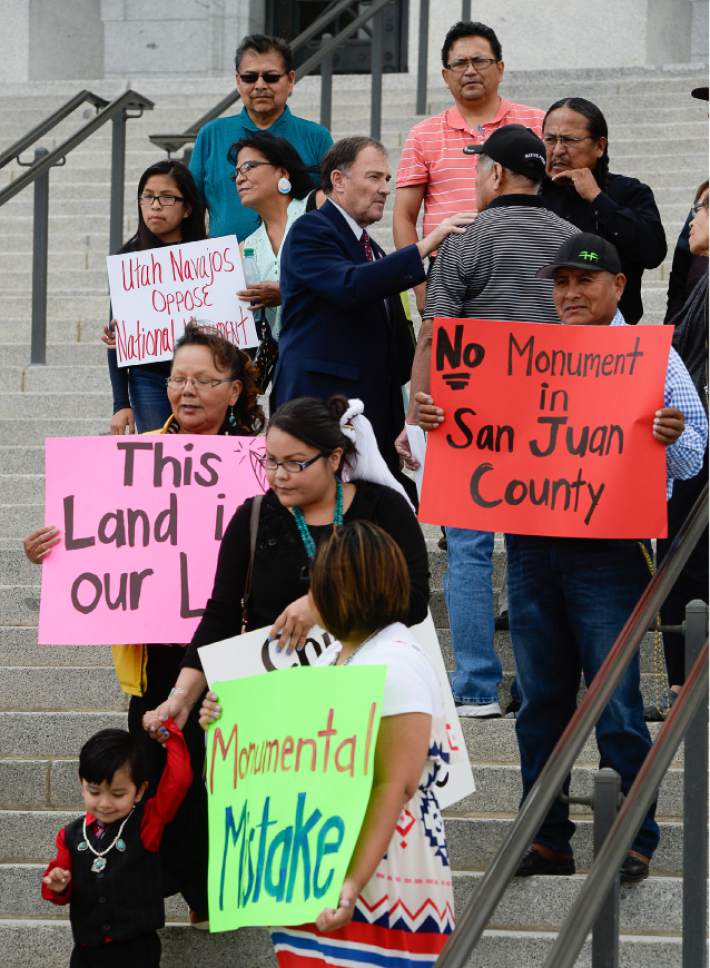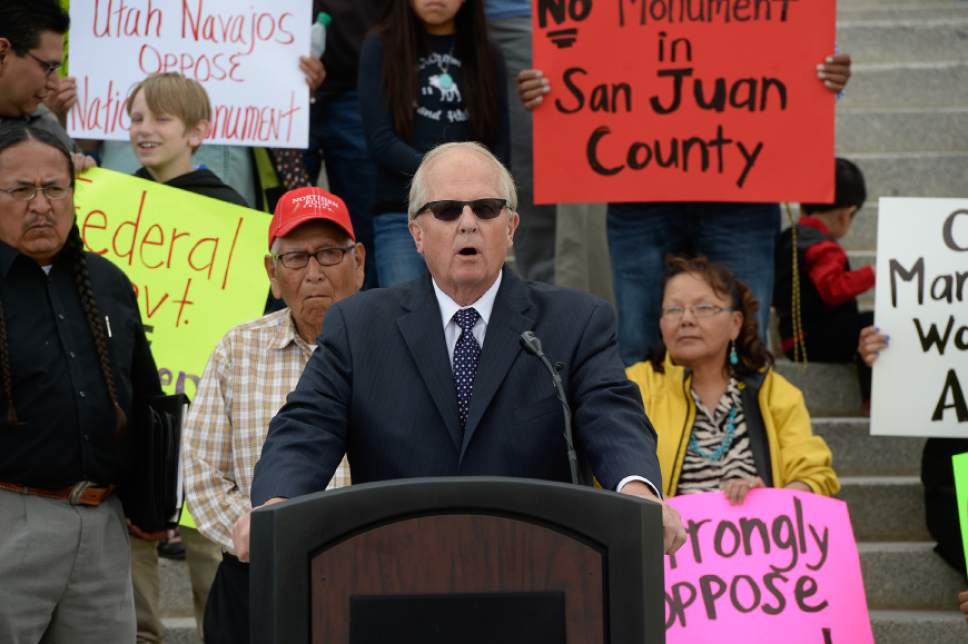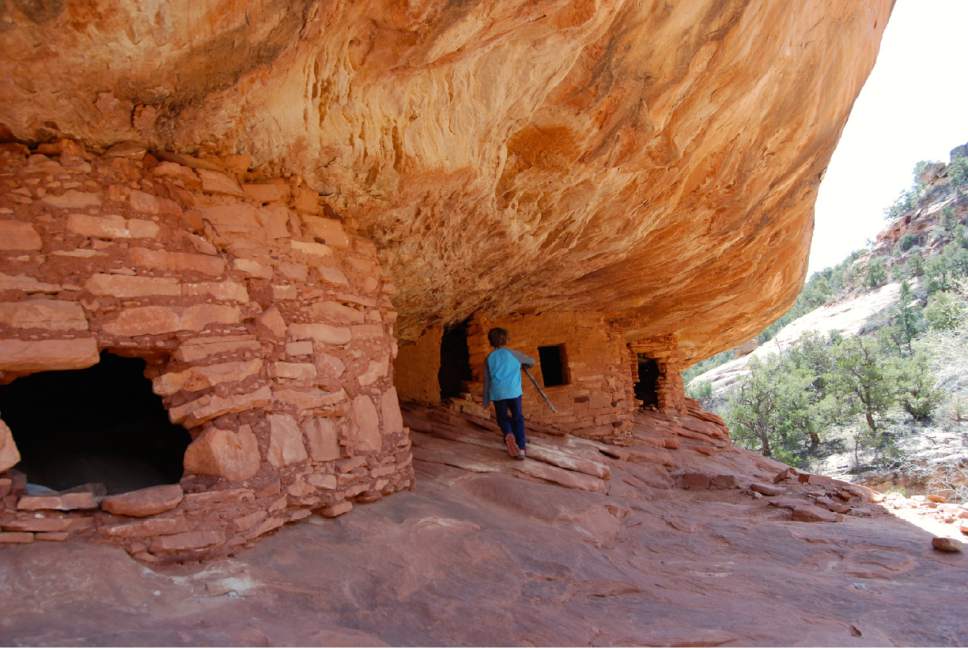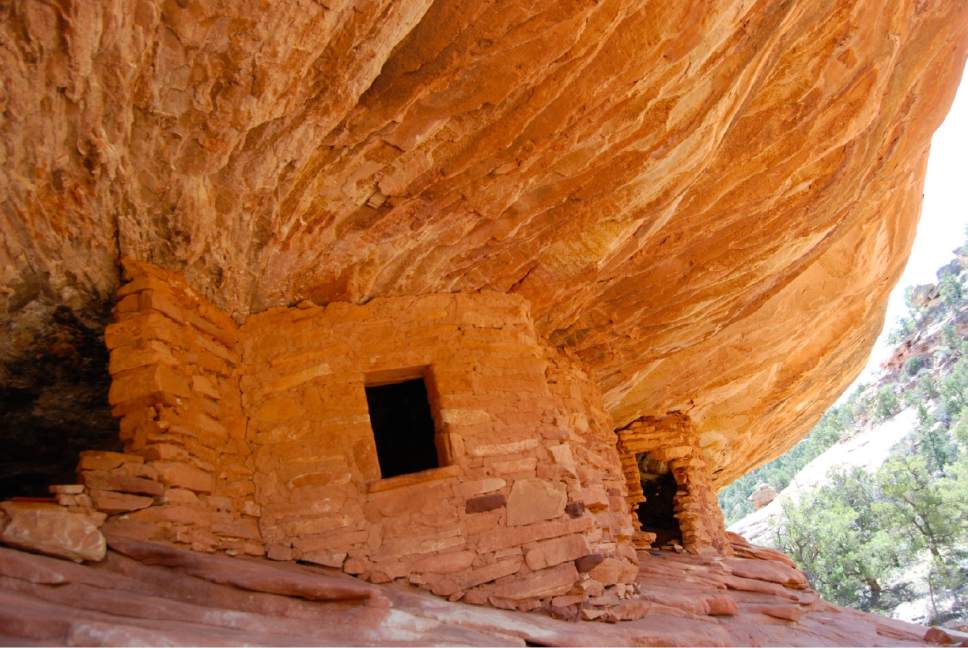This is an archived article that was published on sltrib.com in 2016, and information in the article may be outdated. It is provided only for personal research purposes and may not be reprinted.
Despite visceral opposition to a Bears Ears national monument from Utah political leaders, a new poll indicates more than two-thirds of registered Utah voters support such a designation to protect the archaeologically rich region in San Juan County.
However, critics deride the survey, sponsored by Creation Justice Ministries, as "a classic push poll" for framing the question in a way designed to elicit positive responses. Meanwhile, 24 Utah Navajos gathered on the Capitol steps with Gov. Gary Herbert to proclaim they have no interest in seeing a national monument imposed on a place many consider a sacred homeland.
Creation Justice Ministries, a Washington, D.C.-based group that seeks to protect spiritually significant places, commissioned the statewide telephone survey of 500 voters, which found support for a monument outpolled opposition, 71 percent to 20 percent.
"Voters value protecting cliff dwellings, Mormon pioneer artifacts and other unique historic sites from looters," said Shantha Ready Alonso, the group's executive director. "They want to continue enjoying recreational activities, conserve wildlife habitat and provide opportunities for families and children to spend time together and explore nature."
Tuesday's dueling media events came on the eve of the Utah Legislature's special session, during which lawmakers are expected to pass a resolution imploring President Barack Obama to not designate any monument in Utah under the Antiquities Act without legislative approval. The resolution's chief proponents stood with the American Indians, renewing their opposition to a monument the president is widely assumed to be considering as his tenure comes to an end.
Marie Holiday of the Navajo Oljato community said she fears she will have to travel 80 miles farther to gather firewood and pinyon nuts if the proposed 1.9 million-acre area becomes a monument. She and the others at the Capitol want a conservation plan, but not one controlled by the federal government.
"We want a conservation area so we have access to land we have used for many years," said Chester Johnson, of the Aneth Chapter. "This land relates to our ways that are traditional. We get food there. We get medicine."
Monument backers, like Willie Grayeyes and Mark Maryboy of Utah Dine Bikeyah, couldn't agree more and believe a monument is the best way to ensure both preservation of a fragile landscape and access for traditional practices.
Despite numerous monument endorsements from Navajo, Hopi, Zuni, Ute and other tribal leaders, Utah lawmakers say tribal support is a "charade" manufactured by groups fronting for environmentalists.
That charge was repeated Monday by U.S. Rep. Rob Bishop, R-Utah, when he spoke on Trib Talk, The Salt Lake Tribune's online public affairs video chat.
He dismissed the Bears Ears Inter-Tribal Coalition as "an outside group funded by outside resources, and their call for a monument is the opposite of what would be most beneficial."
Bishop said a national monument designation would impose all sorts of land-use restrictions and prevent tribal members from playing an active role in management.
"The coalition is proposing a plan of management that is totally unworkable and would lead to a great deal of disappointment," he said. "Their hunting and gathering practices are in conflict with the very nature of a monument. Once you have a monument, you turn over all sorts of operational control to the land manager. There has not been a monument where the types of gathering techniques they want are allowable. It is specifically allowed in our conservation efforts."
Bishop, the House Natural Resources Committee chairman, is the chief architect of the Utah Public Lands Initiative, which he says offers a compromise between development and conservation in seven eastern Utah counties and proposes a national conservation area for Cedar Mesa and Bears Ears buttes.
Bishop said he expects to introduce the bill — in the works for three years — to Congress "very, very soon."
A "unilateral" monument designation from Obama could derail the entire process, Bishop warned.
"There is no local buy-in," Bishop said. "There is no one who lives in that area who wants a monument. You have to go at least a five-hour drive away from that area to find someone who wants a monument."
That assertion is ridiculous, according to leaders of Utah Dine Bikeyah, the grass-roots tribal group that began developing the Bears Ears conservation initiative in 2010. They say they have engaged at least 7,000 tribal members who live in or near San Juan County and have seen minimal opposition to a monument. Supporters include Utah Navajo Nation Council's two Utah delegates, Herman Daniels and Davis Filfred; and Ute Mountain Ute tribal council members Regina Lopez-Whiteskunk and Malcolm Lehi.
The polling that documented — or conjured, depending on perspective — broad monument support was conducted between May 11 and 14 and has a margin of error of 4.38 percentage points.
"Support for designating these public lands as a national monument is broad based across age, gender, religion, political party and geographic regions of the state," said pollster Lori Weigel of Public Opinion Strategies.
Among Republicans, Mormons and sportsmen, the poll found 63, 68 and 65 percent, respectively, support a monument designation. However, two-thirds of the respondents did not know much about the monument proposal, so the pollster provided a brief description.
That component "pushes the outcome toward a supportive result by painting an image of a national monument where recreation and grazing are protected, which doesn't square with Utah's actual experience with national monuments," said David Buer of the Sutherland Institute. He referenced the Grand Staircase-Escalante National Monument, where grazing has declined in the two decades since President Bill Clinton designated it.
Yet the poll found even stronger monument support among the one-third familiar with the Bears Ears debate.
"Two in five said they were strongly in support," Weigel said. "It extended across geographic lines, 67 percent in rural areas."
Some monument supporters say political leaders are out of step with most Utahns. The region's archaeological sites warrant a national monument, according to Josh Ewing, a Bluff resident who runs Friends of Cedar Mesa, because they remain under constant threat of looting, careless visitors and illegal ATV incursions.
He says ideology is trumping facts among opponents partly because it is primary season, which fosters a political "race to the right."
"It shouldn't come down to a popularity contest or political gamesmanship," Ewing said. "The ideological opposition to a monument is not supported by the public, either in San Juan County or across the state. To kowtow to this ideology is to ignore the will of the people and the morally right thing to do."
Brian Maffly covers public lands for The Salt Lake Tribune. Maffly can be reached at bmaffly@sltrib.com or 801-257-8713.
Twitter: @brianmaffly


